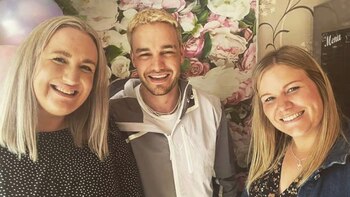
The MU or B.1621 variant was named after the World Health Organization (WHO) and emerged in Colombia at the beginning of January 2021. In Mexico it was listed as of interest because studies are still being carried out to detail its characteristics.
Like the previous variants, Mu caused uncertainty about how to deal with it, the specific care to avoid infections and whether vaccination influences to counteract the effects. According to a study shared by the specialized life sciences site, BiorXIV, this new variant of COVID-19 is more resistant to the Pfizer BioNTech vaccine and to convalescent sera.
It should be clarified that studies on the variant are not yet conclusive, as tests are still being carried out to determine its level of resistance, but sanitary measures to prevent the reproduction of the virus are an important factor in reducing the severity of COVID-19.

The mutations that were detected in this variant make it more transmissible, although its degree of resistance is similar to that of the Delta variant. Although Mu has been detected in only 39 countries in South America and Europe, WHO reported that it has been growing steadily during the spread.
According to data from the Pan American Health Organization (PAHO), it was detected in Mexico in the State of Puebla, in the State of Mexico and in Mexico City, although its presence is only 3%, while that of the Delta variant is 96%.
The Undersecretary of Health, Hugo López-Gatell, in a press conference classified it as of interest, because the WHO calls it a variant that “present changes in the genome that have been demonstrated or predicted to affect characteristics of the virus such as its transmissibility, the severity of the disease it causes and its ability to escape the action of the immune system, be detected by diagnostic means or be attacked by medicines”.

The best protection against this variant is basic sanitary measures as against any type of SARS-CoV-2, that is, ventilation in enclosed spaces, frequent hand washing, healthy distance and the primary use of face masks.
COVID-19 vaccines are the best way to reduce severe cases of new variants, but people who do not yet have their complete schedule must be more careful in their care and not be in contact with many people other than their daily environment.

Much of the experts in the research of new coronavirus strains stated that if a person has already contracted the virus, after its recovery he has a certain level of immunity, although they have not determined how long the protection lasts due to continuous changes of the variants.
Likewise, they have warned that certain types of variants found in South Africa and Brazil due to their mutations evade natural antibodies, which causes the person who was previously ill to catch the coronavirus again.
For its part, in childhood, the new Mu variant is less likely to be aggressive compared to adults.
KEEP READING:
Últimas Noticias
Debanhi Escobar: they secured the motel where she was found lifeless in a cistern
Members of the Specialized Prosecutor's Office in Nuevo León secured the Nueva Castilla Motel as part of the investigations into the case

The oldest person in the world died at the age of 119
Kane Tanaka lived in Japan. She was born six months earlier than George Orwell, the same year that the Wright brothers first flew, and Marie Curie became the first woman to win a Nobel Prize

Macabre find in CDMX: they left a body bagged and tied in a taxi
The body was left in the back seats of the car. It was covered with black bags and tied with industrial tape
The eagles of America will face Manchester City in a duel of legends. Here are the details
The top Mexican football champion will play a match with Pep Guardiola's squad in the Lone Star Cup

Why is it good to bring dogs out to know the world when they are puppies
A so-called protection against the spread of diseases threatens the integral development of dogs




